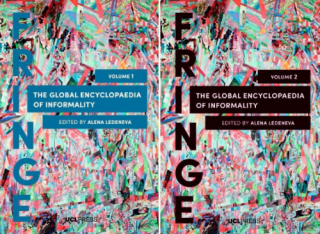Past Events
- 20 March 2019 - Roundtable discussion on EU’s Toolbox in Handling Internal and External Challenges
In recent years, the EU has faced several major challenges. Experts meet in Brussels for a roundtable discussion on what tools the Union has to solve these, and what role it can play in the time to come. Can the EU regain the trust of its citizens as well as those living in conflict areas whose rights it wishes to protect or promote? What role can the EU have in the transformation of its Eastern neighbours into peaceful and prosperous democracies? And what lies ahead for the relationship between the EU and other major powers such as Turkey?
To highlight these crucial questions, the roundtable discussion brought together findings from four, international and interdisciplinary H2020-funded research projects: EUNPACK, EU-STRAT, FEUTURE, and INFORM, which was represented by prof. Eric Gordy.
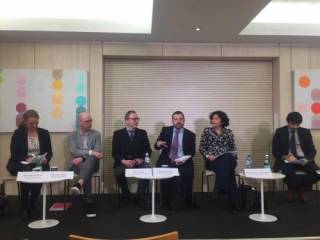
Location: Brussels, Belgium
- 7 - 8 March 2019 - International Seminar: “Entrepreneurship and Development from Regional Perspective. Exchange of Academic Experiences among Erasmus+ Program Countries”
On 7 - 8th March 2019, The Institute for Financial Research and Analyses (IBAF) hosted the International Seminar: “Entrepreneurship and Development from Regional Perspective. Exchange of Academic Experiences among Erasmus+ Program Countries” at University of Information Technology and Management in Rzeszow, Poland. INFORM researcher, Prof. dr. Adnan Efendic, presented results of the research “Costs of informal networking of entrepreneurs – evidence from the Western Balkans region” from INFORM project. It was noted that investing in informal networks is done at a high cost, which implies that the culturally determined sociability of informal networking has an instrumental purpose in this region.
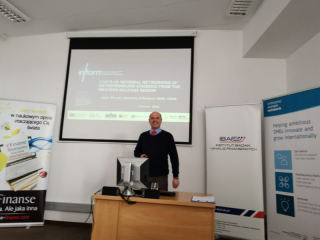
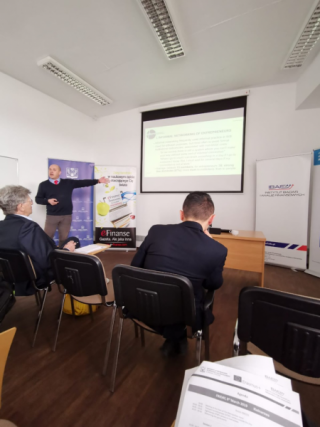
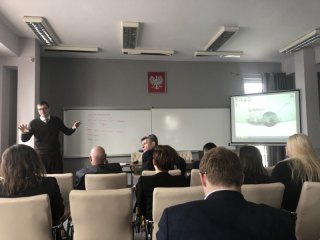 Location: Rzeszow, Poland
Location: Rzeszow, Poland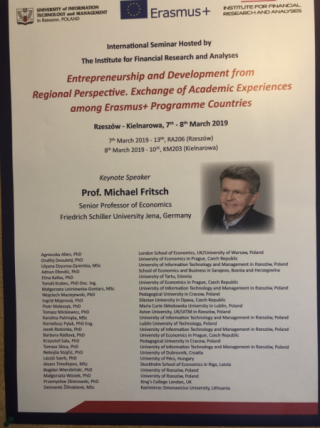
- 8 February 2019 - INFORM Final Conference
- 16 January 2019 - Seminar on the effect of ethnic diversity on income
The empirical study was presented by Geoff Pugh, INFORM Advisory board member and Professor of Applied Economics at Staffordshire University Business School. It was based on a published paper The effect of ethnic diversity on income – an empirical investigation using survey data from a post-conflict environment, co-authored with INFORM researcher Adnan Efendic. The paper uses nationally representative cross-sectional survey data gathered within INFORM project together with additional sources to investigate the effect of ethnic diversity on personal and family incomes in Bosnia and Herzegovina (BiH), a post-conflict society.
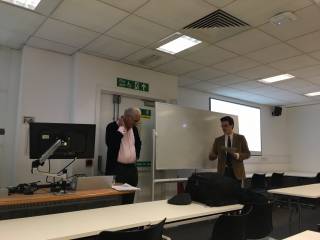 Location: London, the United Kingdom
Location: London, the United Kingdom- 7 December 2018 - The global encyclopedia of informality roundtable at ASEEES conference
“The global encyclopedia of informality: towards understanding of social and cultural complexity”, edited by prof. Alena Ledeneva, UCL, was presented at a round table organized as part of the ASEEES conference in Boston, USA. This is one of the largest conferences in the world covering Slavic, East European and Eurasian studies and this year has hosted over 600 sessions. The members of INFORM team presented the main findings from Encyclopedia and participated in the roundtable discussion.
INFORM team: prof. Alena Ledeneva (presenter), prof. Eric Gordy (roundtable member), prof. Predrag Cveticanin (roundtable member), prof. Adnan Efendic (participant), prof. Vjollca Krasniqi (participant), Misha Popovikj (participant) and dr Nirha Efendic (participant).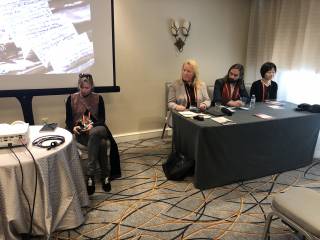
Location: Boston, Massachusetts, USA
- 6 December 2018 - INFORM panel at ASEEES conference
A panel from INFORM project was hosted by the ASEEES conference in Boston, USA, on 06 December 2018, titled “Informal practices and institutions in Southeast Europe: Findings from the INFORM project”. This is one of the largest conferences in the world covering Slavic, East European and Eurasian studies and this year has hosted over 600 sessions. The INFORM team has presented the main findings from the INFORM project coming from political, economic and everyday life fields. The audience showed a lot of interest for the project and enriched the panel with fruitful discussion and comments.
INFORM team: prof. Eric Gordy (chair), prof. Alena Ledeneva (discussant), prof. Predrag Cveticanin (presenter), prof. Adnan Efendic (presenter), prof. Vjollca Krasniqi (presenter), Misha Popovikj (presenter) and dr Nirha Efendic (participant).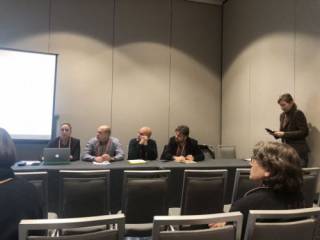 Location: Boston, Massachusetts, USA
Location: Boston, Massachusetts, USA- 6 December 2018 - Conference on life in an age of death
The paper "Phantom rebellion: recruitment of the dead to align with the state in a Montenegrin village" was presented during the panel "Bringing the past to life: narratives, practices and spaces of memory-making", convened by Nevena Škrbić Alempijević (University of Zagreb) and Klāvs Sedlenieks at the Australian Anthropological Society 2018 conference with a theme "Life in an Age of Death". The panel focused on ways in which the past is brought to life through memory-making processes. It explored contemporary and historical memory cultures in their various forms: from the historical knowledge production and narratives of the past to its material, spatial and performative evocations.
Sedlenieks' paper is based on the fieldwork that he did in Njeguši, a small village in Montenegro within the INFORM project. Although the village itself is slowly disappearing as the old people are dying and young ones move out, the phantoms still live and continue to fight. In 1832 Vukolaje Radonjic, a representative of one of the local families and guvernadur (governer) was taken to prison, more than 30 of his relatives were driven from the village and some killed. Houses were burned and levelled. As the official iconography portrayed this event in the light of a just punishment for betrayal and consequently virtually erased Vukolaje from history, several contemporary descendants are trying to revive the memory by investing in restored buildings and churches. However, when they finally decide to hold an official inauguration ceremony of the commemorative centre, they are confronted with the police which is sent in under the pretence of riot prevention. The contemporary Radonjici were carving their moral position in the contemporary Montenegro by means of recruiting the might of a phantom army of Vukolaje Radonjic. For them guvernadur symbolises opposition to the current perceivably corrupt elite and allows to position themselves as defenders of openness, democracy, education and Western values. However, an even more powerful phantom operates on the other side – that of the prince-bishop Petar II Njegoš who once ordered the mentioned arrests and who is undeniably the most famous historic figure in Montenegro. This is then a story of a phantom clash which elucidates competing performances through which various groups of citizens forge their alliances with the (phantom) state of their choice.
Location: Cairns, Australia
- 25 October 2019 - INFORM team members participated in SMARTEiz H2020 Round Table and Conference
The INFORM team members, Ismet Kumalic, Edin Pasovic and Adnan Efendic, participated in SMARTEiz H2020 round table: “New Issues Relevant for Smart Specialisation Strategy in European “Periphery” Countries”, hosted by The Economics Institute, Zagreb. The round table was part of the 2ndInternational SINCERE conference „Smart Ideas and a New Concept of Economic Regeneration in Europe“.
As the part of the first day conference programme, an INFORM paper on the costs of informal networking with relevant policy implications for the Western Balkans region was presented to the audience. The conference was organized by the University of Dubrovnik.
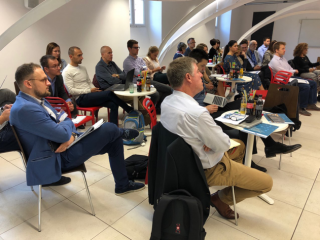
- 22 October 2018 - "The Global Encyclopaedia of Informality"
INFORM researcher Prof. Alena Ledeneva presented a book "The Global Encyclopaedia of Informality". The book presentation was hosted by the INFORM Latvian team - Klāvs Sedlenieks, Ieva Puzo and Diāna Kiščenko (Dubrovska) from Riga Stradiņš University.
Free download of the book is available here.
YouTube Widget Placeholderhttps://youtu.be/oMlPMGmCrYw - 18 October 2018 - International Conference "Tracing Informality in Southeast and Northeast Europe: Anthropological Perspectives"
INFORM researchers Klāvs Sedlenieks, Ieva Puzo and Diana Kiscenko (Dubrovska) from Riga Stradins University participated at the international conference "Tracing Informality in Southeast and Northeast Europe: Anthropological Perspectives" on 18-19 October 2018 in Riga, Latvia.
More information about the conference available here.
Conference program.
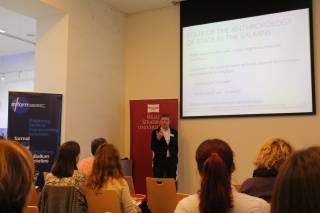
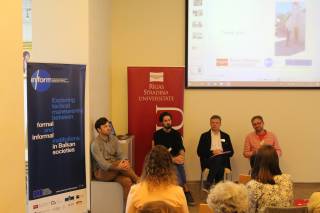
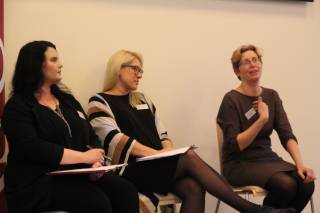
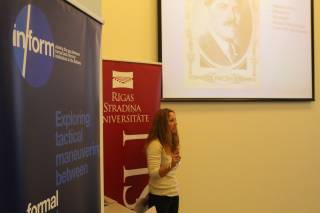
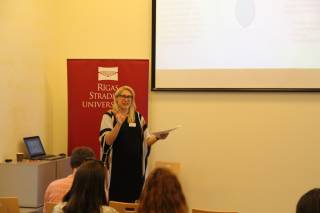
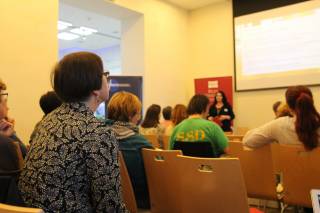
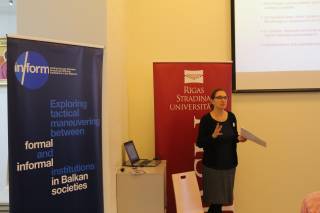
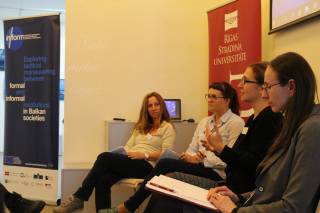
- 14 October 2018 - Interview with researcher Diāna Kiščenko to Latvian magazine "Annas Psiholoģija"
During the interview for Latvian magazine "Annas Psiholoģija" our researcher Diāna Kiščenko goes back to her several month long fieldwork in Montenegro. She shares her insights of sex-selected abortions and how kinship traditions shape Montenegrin society. Her anthropological findings in English can be found in the report "Informal institutions in everyday life. Montenegro" cowriten by Diāna, Klāvs Sedlenieks and Ieva Puzo.
Location: Riga, Latvia
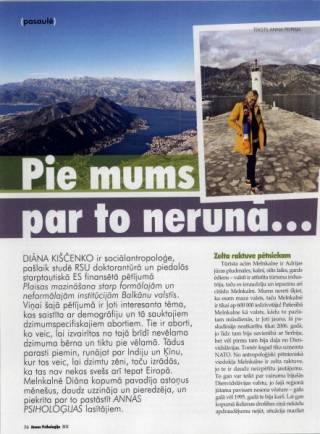
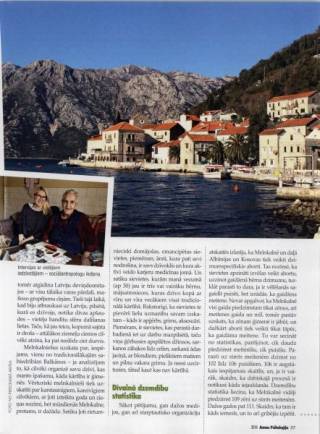
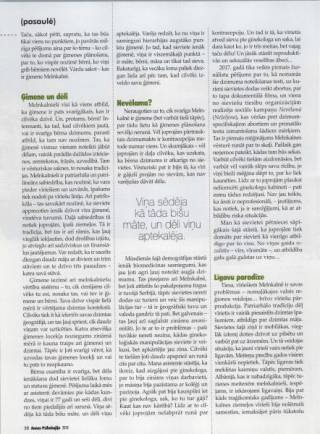
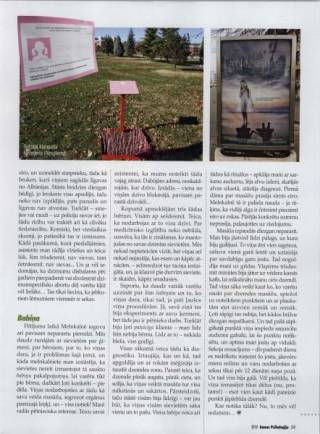
- 12 October 2018 - Researchers from Inform Project participated at ICES2018 International Conference
University of Sarajevo, School of Business and Economics, organized its 9th International Conference of the School of Economics and Business (ICES2018). INFORM researcher Adnan Efendic presented the paper “Modelling the costs of informal networking: Evidence from the Western Balkans region”, while Edin Pasovic presented the paper “Informal economy in Bosnia and Herzegovina – An empirical investigation using MIMIC approach”. The both papers opened an interesting discussion and gathered useful comments.
Location: Sarajevo, Bosnia and Herzegovina
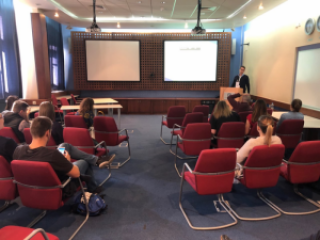
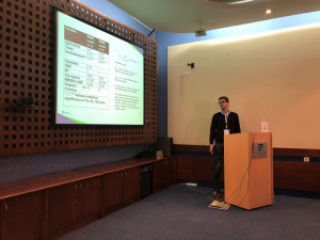
- 28 September 2018 - INFORM researchers participated at the European Researchers' Night
INFORM researchers Klāvs Sedlenieks, Ieva Puzo and Diāna Kiščenko (Dubrovska) from Riga Stradins University participated at the European Researchers' Night on 28 September 2018 in Riga, Latvia. In the event "Informally about formal" RSU social anthropologists' told stories about their research in Montenegro on the process of political and economic decision-making, academic personnel and student mobility and family planning practices in Montenegro.
More details available here.
"The European Researchers' Night takes place yearly, typically starting on the last Friday of the month of September, and is the occasion for a Europe-wide public and media event for the promotion of research careers, in particular towards young people and their families."
More information about the European Researchers' Night available here.
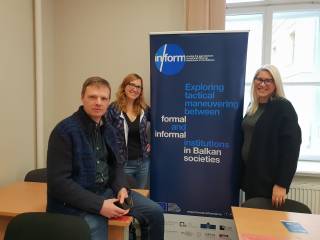
Location: Riga, Latvia
- 28 September 2018 - Inform team members participated at the “Horizon 2020 Proposal Writing Days”
INFORM team members dr. Adnan Efendic and MSc. Edin Pasovic, participated at the “Horizon 2020 Proposal Writing Days” workshop held 27-28 September 2018 at the Chamber of Commerce and Industry of Republika Srpska in Banja Luka. The event was organized by the International Cooperation Service Facility of the European Commission.
Location: Banja Luka, Bosnia and Herzegovina
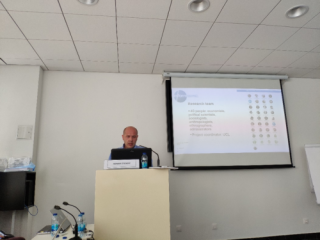
- 25 September 2018 - INFORM National Workshop in Serbia
On 25 September 2018, The Centre for Empirical Cultural Studies of South-East Europe hosted the second INFORM consultative meeting with representatives of the Ministry of European Integration of the Republic of Serbia in Belgrade, Serbia.
Meeting agenda:
1. A presentation of the findings of empirical studies carried out within the INFORM project.
2. Discussion - exchanging views, gathering suggestions from the ministry representatives regarding further data analyses.
3. Agreements on further cooperation.
The Ministry of European Integration was established on June 26, 2017, when the European Integration Office ceased to exist. The Ministry cooperates with the Mission of The Republic of Serbia to the European Union in the accession process to the European Union, and also cooperates with the Ministry of Foreign Affairs and other competent state authorities in considering issues which refer to defining the needs and meeting the requirements for the positions of the diplomatic staff working for the Mission of The Republic of Serbia to the European Union in all the stages of EU integrations, as well as other activities related to the field of accession to the European Union (more information available here).
Location: Belgrade, Serbia
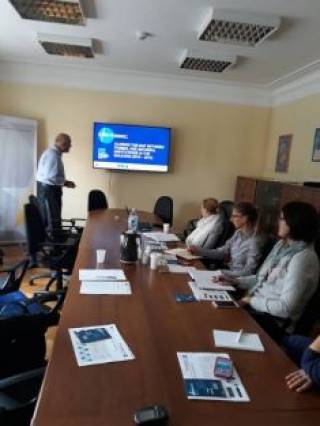
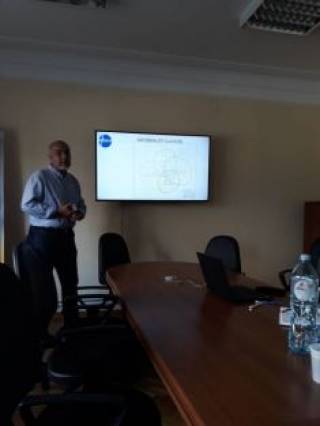
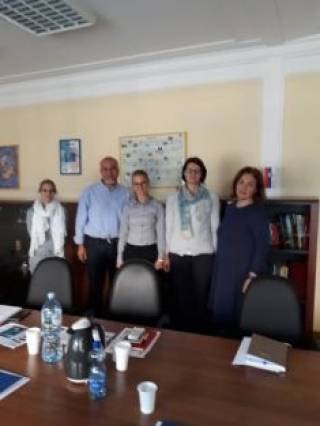
- 20 September 2018 - INFORM researchers participated at the international conference in Prishtina
INFORM researcher, Assoc. Professor Hariz Halilovich, participated at the international conference “Revisiting Dealing with the Past and Transitional Justice in the Balkans”, held in Prishtina 20-23 September.
Location: Prishtina, Kosovo
- 13 September 2018 - INFORM researcher participated in a public discussion on the need for future socio-economic reforms in Bosnia and Herzegovina.
INFORM researcher prof. Adnan Efendic, participated as a panelist in a public discussion on the need for future socio-economic reforms in Bosnia and Herzegovina (BiH), organized by the Delegation of the EU at the School of Economics and Business in Sarajevo. The event was attended by the Head of the EU delegation in BiH, German and Swedish ambassadors, representatives of the business sector, academic community and wider audience. The public discussion was covered by local media. Among other topics, there was discussion about the efficiency of formal institutions and reliance on informal institutions and economy in BiH.
Location: Sarajevo, Bosnia and Herzegovina
- 12 September 2018 - The Social Research Kosovo INFORM team hosted its second National Workshop in Pristina, Kosovo.
On 12 September 2018, the Social Research Kosovo INFORM team hosted its second National Workshop in Pristina, Kosovo.
The goal of the second national workshops was to engage representatives of national office for European integrations and other relevant stakeholders in order to present project’s research results and policy recommendations, as well as to gather expert feedback on it.
Participants in the workshop posed questions and commented on the research results of the INFORM project. The INFORM project is perceived to be important in this field as there is a lack research in informal economy. It was stressed that Kosovo needs data on informal economy to address policy and regulation of private sectors and ensure the respect for workers’ rights (employment through contracts, reporting of revenues and implementation fines for company tax evasion).
Participants found that the INFORM findings on informal practices confirms the general knowledge on informality. The prevalence of connections as an informal practice widens the gap between citizens and the state. As a result, this translates in the erosion of trust in public institutions.
On the Western Balkans INFORM survey results related to the EU integration and membership, the participants expressed that the data reflect the aspirations of the Kosovars for the EU membership.
The discussion took place on the issue of informality in politics, political clientelism and the connections of politics and businesses. Participants in the workshop discussed the role of elites and the need for democratic leadership that as a precondition for genuine democratic consolidation. In terms of the research data, participants found the findings on clientelism interesting, especially on the level of political parties in vote-buying. One interesting remark made concerns the comparison of this particular finding between Kosovo and Albania. The data indicate that vote-buying is more pronounced in Albania than Kosovo. Participants discussed the role of education from primary to university levels on democratic culture, human rights and citizenship.
Participants have given much thought on the issue of law making in Kosovo. They have pointed out that while Kosovo has a sound legal infrastructure and in compliance with the EU law, many of the laws are passed as ‘urgent’ and through shorten time for consultations and public discussion. Participants expressed that weak implementation of laws reflects the system of lawmaking that does not follow a coordinated state agenda on legal reform but responses on ad hoc basis and often time driven by a particular political group. The harmonization of Kosovo laws with the EU law is perceived to be important but that there is a need for more consideration of their concomitance with the cultural aspects and institutional capacities so that the laws do not remain empty shells.
Agenda
10:00-10:15 Registration
10:15-11:00 Welcome note and presentation of INFORM research results, by Dr Vjollca Krasniqi
11:00-11:15 Coffee break
11:15-12:15 Discussion: How can INFORM project support policy-making in Kosovo?
12:15 -12:30 Recommendations and closing of the meeting
Participants
INFORM representatives:
1. Dr. Vjollca Krasniqi, Social Research Kosovo, INFORM lead researcher for Kosovo
2. Ms. Teuta Osmani, Social Research Kosovo
3. Ms. Diellza Gojani, Social Research Kosovo
Directorate for European Integrations and others:
1. Mr. Artan Ҫollaku, Directorate for European Integrations
2. Ms. Fitore Pacolli, Kosovo Assembly
3. Mr. Ilir Muçaj, Directorate for European Integrations
Location: Prishtina, Kosovo
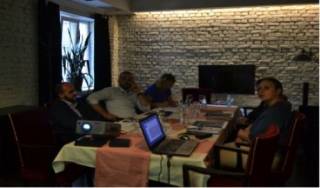
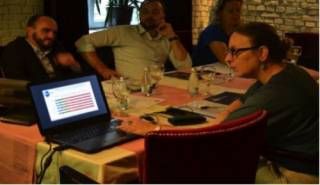
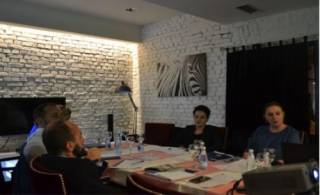
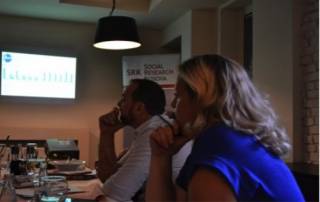
- 6 September 2018 - Meeting held between INFORM research team representatives and DGNEAR representatives at DGNEAR HQ, Bruxelles.
On 6th of September, 2018, the third meeting was held between INFORM research team representatives and DGNEAR representatives at DGNEAR HQ, Bruxelles. The main emphasis of this meeting was to discuss INFORM's research latest results in the context of their policy implications and their potential to form policy recommendations. Specifically, main findings from six distributed policy briefs, covering six areas of (in)formality – Enforcement of EU rules, Cost of Informality, Leaders Meetings, Clientelism, EU communication, Informality in everyday life – were presented and discussed.
Agenda:
Introduction, outlining the INFORM Project progress: Eric Gordy, University College London, UK Enforcement of EU rules in the WB countries: Rudi Klanjšek, University of Maribor, Slovenia Costs of informality and costs of ethnic homogeneity: Adnan Efendić, Center for Intradisciplinary Social Applied Research, Bosnia and Herzegovina The problem of clientelism, and leadership meetings in the WB countries: Ivan Damjanovski, Institute for Democracy “Societas Civilis” Skopje, Macedonia Policy related issues regarding everyday life and EU-WB communication: Klavs Sedlenieks, Rigas Stradina Universitate, Latvia Presenting and detailing five most important policy recommendations Discussion
Participants, INFORM:
Eric Gordy, INFORM lead, University College London, UK Rudi Klanjšek, INFORM WP5 lead, University of Maribor, Slovenia Adnan Efendić, INFORM WP4 lead, CISAR, Bosnia and Herzegovina Ivan Damjanovski, Institute for Democracy "Societas Civilis“ Skopje, Macedonia Klavs Sedlenieks, INFORM WP6 lead, Riga Stradins University, Latvia
Participants, European Commission:
Davide Denti, NEAR D4 Joakim Frendim, NEAR Hisida Gidesi, NEAR D4 Ritva Heikkinen, NEAR A3 David Hudson, NEAR A1 Sanja Marinkovic, EEAS Camelia Paroselic, NEAR A2
Location: Brussels, Belgium
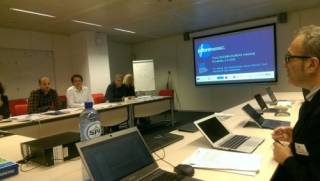
- 30 August 2018 - INFORM researcher participated at the European Sociological Association conference
INFORM researcher Miloš Jovanović from the Centre for Empirical Cultural Studies of South-East Europe participated at the European Sociological Association conference on 30-31 August 2018 in Milan, Italy.
More details available here.
Location: Milan, Italy
- 14 August 2018 - INFORM researchers participated at the European Association of Social Anthropology conference
INFORM researchers Klāvs Sedlenieks and Diāna Dubrovska from Riga Stradins University participated at the European Association of Social Anthropology conference on 14-17 August 2018 in Stockholm, Sweden. Klāvs Sedlenieks presented a paper "The 15cm road: paving the state in a Montenegrin village". Diāna Dubrovska talked about the reproductive medical mobility of Montenegrin women to Serbia.
"Staying, Moving, Settling" was the theme of the 15th EASA biennial conference which was hosted by Stockholm University. More details available here: https://www.easaonline.org/conferences/easa2018/
Location: Stockholm, Sweden
- 3 July 2018 - Center for Intradisciplinary Social Applied Research (Sarajevo, BiH) hosted its second National Workshop in the INFORM project framework
On 3 July 2018, the Center for Intradisciplinary Social Applied Research (Sarajevo, BiH) hosted its second National Workshop in the INFORM project framework.
The goal of this national workshop was to engage with representatives of national offices for European integration, as well as other important stakeholders/experts and policy makers and request their contribution to raising awareness about the INFORM project. Another important goal of the workshop was to get feedback from the participants, based on their expertise, on the obtained results and policy implications.
Representatives of the Directorate for European Integration of BiH, the Ministry for Human Rights and Refugees of BiH, as well as the country’s academic and research community participated in the workshop, taking active part in it and providing their feedback, ideas, comments and suggestions. The participants’ comments will be used to improve the outputs of the project during its final year.
The CISAR was represented by Dr Adnan Efendic, Dr Hariz Halilovich, Dr Ismet Kumalic, and Mr Mirza Mujaric.
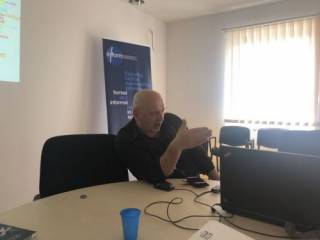
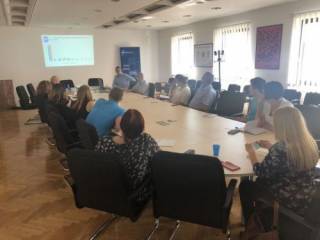
- 27 June 2018 - INFORM national workshop in Albania
On 27 June 2018, the Center for Historical and Anthropological Research (QKHA) INFORM team hosted its second National Workshop in Tirana, Albania. The workshop brought together researchers of the QKHA and representatives of the Ministry for Europe and Foreign Affairs.
After the presentation of the survey and research results in the framework of INFORM project, the discussion participants focused on the importance of these results for understanding the problems that Albanian citizens face in their everyday life and the mechanisms they use to solve the identified issues. The workshop participants expressed their interest in the informal practices the INFORM research team observed during the last election period. They also provided suggestions on the best ways for the QKHA INFORM team to disseminate the research results further and contribute to the policy making process in Albania.
Participants:
- Ms. Lorela Simoni, Ministry for Europe and Foreign Affairs
- Mr. Ervis Sulejmani, Ministry for Europe and Foreign Affairs
- Ms. Bjona Ziaj, Ministry for Europe and Foreign Affairs
- Ms. Sonila Muskaj, Ministry for Europe and Foreign Affairs
- Ms. Armanda Hysa, Center for Historical and Anthropological Studies
- Ms. Enriketa Pandelejmoni, Center for Historical and Anthropological Studies
- Ms. Gentiana Kera, Center for Historical and Anthropological Studies
- 25 June 2018 - INFORM researcher participates in an international workshop on clientelism
On 25-26 June 2018, INFORM researcher Jovan Bliznakovski participated in the international workshop “The Demand Side of Clientelism: Agency, Trade-Offs, and Welfare Implications”. The event was organised and hosted by the Institute of Political Science, University of Duisburg-Essen.
During the workshop, based on research carried out in the INFORM project framework, Jovan Bliznakovski presented a paper titled “Benefit-seeking in Clientelism: Evidence from six Balkan Countries”.
Event program available here (pdf file).
Location: Duisburg, Germany
- 21 June 2018 - INFORM researcher gives an interview to the leading men's magazine in Latvia
In June 2018, INFORM researcher Klavs Sedlenieks from Riga Stradins University shared preliminary research results from his ethnographic fieldwork in Montenegro with “Klubs”, Latvia's leading men's magazine. The interview is set to appear in print in the July 2018 issue of the magazine.
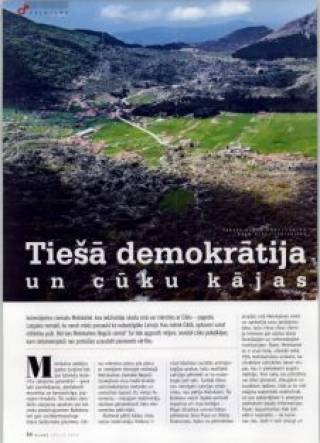
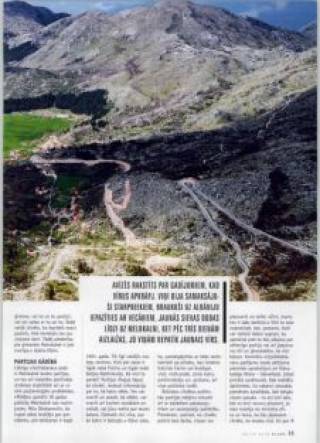
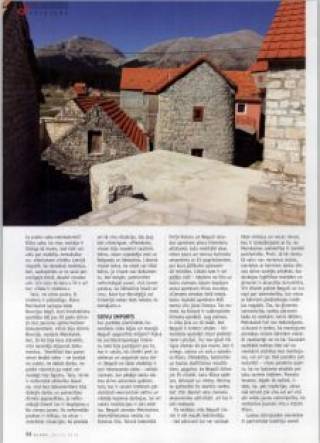
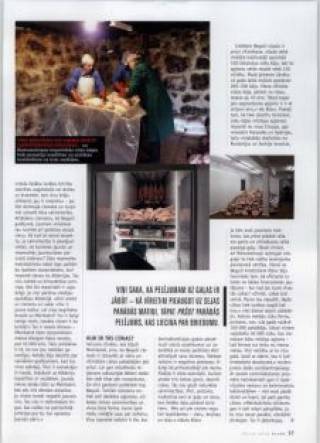
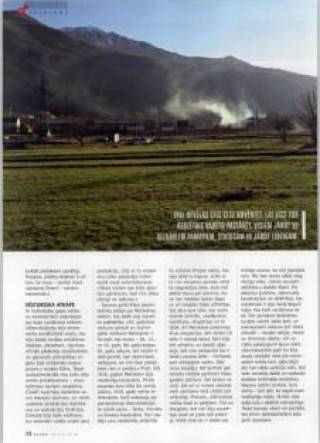
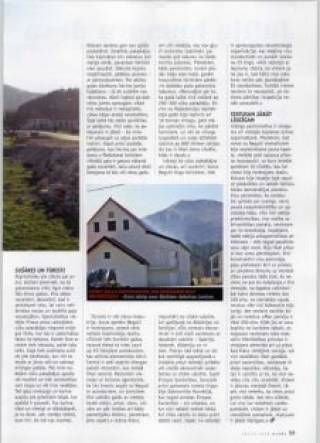
- 20 June 2018 - INFORM team members from Riga Stradins University presented preliminary research results on Latvia's TV station
On 20 June 2018, Dr Klavs Sedlenieks and Ms Kristine Rolle, INFORM team members from Riga Stradins University presented preliminary research results from the ethnographic fieldwork in Montenegro on Latvia's TV station "LNT" during the popular morning broadcast “900 sekundes”.
Full broadcast (in Latvian) is available here.
- 10 June 2018 - INFORM management board meeting in Serbia
On 10 June 2018, the INFORM project management board hosted a meeting in Belgrade, Serbia to discuss the activities of the 3rd project year.
Draft agenda available here.
Location: Belgrade, Serbia
- 8 June 2018 - INFORM national workshop in Montenegro
On 8 June 2018, the Riga Stradins University INFORM research team hosted the second National Workshop in Podgorica, Montenegro.
The main goals of the second national workshop in Montenegro were the following: to present the research carried by the INFORM team during the first and second project year to representatives of the national offices; to present an outline of policy recommendations devised based on the aforementioned research; to receive feedback from representatives of the national offices on both the conducted research and proposed policy recommendations in order to improve them further.
During the workshop, the INFORM project researchers Dr Klavs Sedlenieks and Ms Diana Dubrovska presented the main results of the INFORM project as a whole, findings from Montenegro, based on ethnographic research carried out by the Riga Stradins University team, and tentative policy recommendations, based on the research carried out in Montenegro. The Ministry, EU Delegation and NGO and research oganisation representatives expressed their interest in the INFORM project and provided feedback on the presented research and policy recommendation outline.
The workshop participants agreed that the INFORM project provides timely and topical data on various processes in Montenegro (e.g. local community organising) and that the anthropological perspective of the Riga Stradins University research team offers crucial and useful glimpses into various aspects of Montenegrin society (e.g., vote-buying, gender issues). They also offered suggestions on how to devise specific to policy recommendations, based on the conducted research, so that they would reach the target audience better. It was also acknowledged that there is a general need – not limited to the INFORM project – to bring together researchers and policy makers in order to implement policy changes in a productive manner.
Participants:
1. Ms Marija Vukčević, Ministry of Foreign Affairs, Directorate General for EU and Regional Cooperation, Director of the Directorate for Regional Cooperation
2. Mr Romain Boitard, Programme Manager at the EU Delegation to Montenegro
3. Mr Stevo Muk, President of the Managing Board, Institute Alternative
4. Mr Marko Sošić, Associate, Institute Alternative
5. Ms Kristina Ulana, Researcher, DeFacto
6. Ms Darja Šuković, Researcher, DeFacto
7. Mr Filip Vicković, Intern, Politikon Network
8. Dr Klavs Sedlenieks, Lead Investigator, INFORM, Riga Stradins University
9. Ms Diana Dubrovska, Researcher, INFORM, Riga Stradins University
Location: EU Info Centre, 19 December 8, 81000 Podgorica, Montenegro
- 6 June 2018 - INFORM researcher presented preliminary research results on Latvia's radio station
On 6 June 2018, INFORM researcher Klavs Sedlenieks from Riga Stradins University presented preliminary research results from his ethnographic fieldwork in Montenegro on Latvia's radio station No 4.
Full broadcast (in Russian) available here.
Report on informal institutions in Montenegro available here.
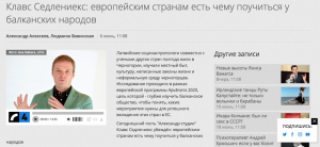
- 30 May 2018 - INFORM researcher participate in a conference of the western Balkan process
INFORM researcher prof. Adnan Efendic participated in the 4th Joint Science Conference of the Western Balkan Process / Berlin Process on 30 May-1 June 2018 in the Accademia dei Lincei, Rome.
The 4th Joint Science Conference of the Western Balkans Process / Berlin Process was organised jointly by the German National Academy of Sciences Leopoldina, the Italian Accademia Nazionale dei Lincei and the Italian National Research Council (Consiglio Nazionale delle Ricerche). The conference brought together around 80 top representatives of national academies of sciences and arts, rectors’ conferences, research organisations, transfer and innovation facilities and distinguished scientists and science managers invited ad personam, from the 14 participating countries of the Berlin Process. The programme also features a dialogue with the Rome-based embassies of the involved countries and a keynote by Federica Mogherini, High Representative of the Union for Foreign Affairs and Security Policy and Vice-President of the European Commission.
The conference has produced recommendations to the Heads of State and Government meeting at the Western Balkans Summit in London, that will be held on 10 July 2018 and titled: “The Path is the Goal: Convergence, Cohesion and Cooperation in South East Europe”.
INFORM researcher prof. Adnan Efendic moderated the session on “Convergence and cohesion in SEE”.
More details available here: http://www.leopoldina.org/en/jsc/
- 25 May 2018 - INFORM researchers participate in an international conference in Serbia
On 25-26 May 2018, INFORM researchers Danijela Gavrilović and Nemanja Krstić from the Centre for Empirical Cultural Studies of South-East Europe presented preliminary research results in the international conference "Tradition, modernization and identities IX: The Role of the University Community in Promoting Regional Development and Affirmation of the Culture of Peace in the Balkans". The conference was hosted by the Faculty of Philosophy, University of Niš, Serbia. The title of the INFORM researchers’ presentation was “Attitudes towards the EU in Six Western-Balkan Countries”.
- 23 May 2018 - INFORM national workshop in Macedonia
On 23 May 2018, the Institute for Democracy “Societas Civilis” - Skopje (IDSCS) organized the second National Workshop in Skopje, Macedonia. The workshop gathered representatives from the Secretariat for European Affairs, the office of the Prime Minister of the Government of Macedonia, the Parliament’s Committee for European Affairs, the Parliament’s National Council on European Integration, and the Parliamentary Institute.
The goal of the workshop was to introduce the INFORM research and policy findings to the representatives from the Macedonian Government and Parliament in charge of the European integration processes. Another aim of the workshop was to initiate a dialogue between the project team and the relevant state bodies and to gather useful feedback from representatives of state institutions.
During the workshop, the INFORM IDSCS project team presented their main findings on citizen perceptions of, attitudes to and spread of informality, as well as the use of connections and involvement in clientelist exchanges. A special emphasis was placed on the INFORM survey findings and the Macedonian public perceptions about the EU accession process.
The workshop participants pointed out informal practices in the policy and law making processes. For instance, they noted that the use of fast track procedures in the Parliament does not offer enough transparency and involvement of the relevant stakeholders. Moreover, they highlighted the practice of political abuse of the ‘so called’ EU flag for laws that are introduced as EU reforms although they do not, in fact, harmonize national legislation with the EU acquis. The workshop participants pointed out that the INFORM project team should take into consideration the changing political will and ongoing reforms in the Parliament in order to advocate for some of the proposed policy recommendations.
During the discussion, the workshop participants shared the opinion that the INFORM project findings can be very useful for defining and understanding the relationhip between informality and formality, and the influence of informality on policy implementation and harmonization with the acquis. It was also pointed out that the policy makers and state administration always welcome the assistance through concrete policy documents and recommendations, especially on how to address administrative and political obstacles and generate political will for substantial reforms for EU accession.
- 22 May 2018 - INFORM researchers presented results at the embassy of Switzerland in Tirana
On 22 May 2018, the INFORM Albania team presented their research results at the Embassy of Switzerland in Tirana. In their presentation, the INFORM project team members outlined some of the main findings from the ethnographic research, conducted from February 2017 to September 2017 and aimed at looking "from below" at the ways in which informal and clientelist practices influenced the general parliamentary elections of June 2017. The presentation focused on the influence of party clientelism on the electoral behavior of voters, showing how electoral campaigns are being used to solve everyday life problems and how they shape citizen perceptions of public institutions.
- 15 May 2018 - INFORM Researchers presented preliminary research results on latvia's main national radio station
On 15 May 2018, INFORM researcher Klavs Sedlenieks, Ieva Puzo and Diana Dubrovska from Riga Stradins University presented preliminary research results from their ethnographic fieldwork in Montenegro on Latvia's main national radio station during the popular science radio broadcast “Zināmais Nezināmajā”.
Full broadcast (in Latvian) available here.
Report on informal institutions in Montenegro available here.
- 10 May 2018 - INFORM researcher participated in the event “open day"
On 10 May 2018, The Directorate for European Integration of BiH organized an “Open Day” at its premises, which was one of the activities celebrating “Europe Day”. This year's focus is on the European Year for Cultural Heritage. INFORM researcher, Prof. dr. Adnan Efendic, presented the results of research focused on the economic effects of cultural and ethnic diversity in Bosnia and Herzegovina. This presentation reported (i) that ethnic pluralism in BiH is a business opportunity rather than a threat, and (ii) how cultural diversity can stimulate income. This presentation ended with an economic interpretation of the BiH slogan for EU integration, “Embrace Diversity”. A member of the INFORM advisory board and co-author of the presented research, prof. dr. Geoff Pugh, also participated in this event and contributed his views on the positive economic effects of cultural diversity in Europe.

Location: Bosnia and Herzegovina
- 27 April 2018 - INFORM researchers participated in the conference "traditional and new religiosity: the past and future"
On April 27-28 April 2018, INFORM researchers Danijela Gavrilović and Miloš Jovanović from Centre for Empirical Cultural Studies of South-East Europe presented preliminary research results in the fourth international scientific conference "Traditional and New Religiosity: The Past and Future" in Srebrno jezero, Veliko Gradište, Serbia. The title of the presentation was “Religion and Morality in Contemporary Serbia”. Presented findings, as well as attempts to explain the observed trends, are related to attitudes towards the European Union, values and religiosity of the observed societies.
- 19 April 2018 - INFORM researcher participated in the conference devoted to post-conflict economies
INFORM researcher Prof. Efendic participated in the conference "Political Economy of Post-Civil War Transitions: Long-run Lessons from Eastern Europe” devoted to post-conflict economies on 19 April 2018 in Princeton University, Princeton, New Jersey, United States.
Prof. Efendic presented a research produced within the INFORM project, titled “Costly informality! Empirical evidence from a post-conflict environment”. The interplay between formal and informal institutions gives rise to both formal and informal institutional costs, the both use economic resources and need to be considered. While there is research on the costs of formal institutional environments, the informal dimension has been rather neglected. Thus, this research uncovers the costs of informal networking of entrepreneurs and individuals in the Western Balkans (WB), as informal networking is identified to be the key vehicle of informality. However, both individuals and entrepreneurs involved in informal networking face non-trivial costs, which are highest in WB countries with the least efficient formal institutions. These costs are affected by both network size and the economic status of respondents. The research finds that individuals in the WB region who invest into informal networking do so at a high cost, but more to gain economic benefits than to follow cultural or traditional preferences.
One day international conference “Political Economy of Post-Civil War Transitions: Long-run Lessons from Eastern Europe” was organized to foster knowledge and set benchmarks for optimal post-conflict transition processes in order to help these countries reaching their goals faster. The presenters were coming from number of universities as Princeton University, Oxford University, Boston University, University of Innsbruck, University of Dubrovnik, University of Tirana, and Ministry of Science and Education of Croatia. Presentations included scientific outputs across several fields and sub-fields in politics, economics and social sciences in general, covering the set of post-conflict and transition countries from the Western Balkans region.
- 26 March 2018 - INFORM researcher participated in the conference "theorising young people's aspirations in a global context"
INFORM researcher Ieva Puzo participated in the conference "Theorizing young people's aspirations in a global context: An interdisciplinary conference" on 26-27 March 2018 in Brunel University, London, United Kingdom.
Ieva Puzo presented a paper titled “Aspiring for Employability: Transnational Academic Mobility from Montenegro". The presentation examined how young people in Montenegro make both sense and use of the formal and informal support mechanisms available to them when they make their academic mobility decisions – both leaving the country and, in many cases, returning to it. The paper discussed ethnographic data collected in Podgorica, the capital of Montenegro, during the summer and fall of 2017, when I carried out 30+ semi-structured and unstructured interviews with students, researchers, administrators, government officials, NGO representatives, and employees of organisations aimed at increasing academic mobility from Montenegro. The paper suggested that Montenegrin students navigate a fluid set of formal and informal resources available to them in the decision-making process about academic mobility – including immobility – with the ultimate aspirational and future-oriented goal of increasing their employability.
Location: Brunel University, London
- 21 March 2018 - INFORM researchers participated in the UCL South-East European Studies Seminar Series
INFORM researchers Armanda Hysa, Gentiana Kera and Enriketa Pandelejmoni from Albanian team participated in the South-East European Studies Seminar Series on 21 March 2018 in University College London, United Kingdom.
In the presentation researchers presented some of the main findings from the INFORM ethnographic research, conducted from February 2017 to September 2017, which aimed precisely at looking "from below" the ways in which informal and clientelist practices influenced the conduction of central elections in Albania held in June 2017.
Information about the event can be found here.
- 13 March 2018 - INFORM researcher discusses ethnic diversity on TV N1
On 13 March 2018, INFORM researcher prof. Adnan Efendić from the Center for Intradisciplinary Social Applied Research appeared on TV N1 to discuss the topicality of addressing ethnic diversity in economic research.
- 15 February 2018 - Researcher Klavs Sedlenieks gave a guest lecture in Uppsala University, Sweden.
INFORM researcher Klavs Sedlenieks gave a guest lecture on 15 February 2018 in Uppsala University, Sweden.
Based on the fieldwork conducted in Montenegro in 2017, the lecture "Urban longings & realities in rural post-socialist Montenegro" gave ethnographic insight into the everyday life, dreams and aspirations of the people who live in Montenegrin countryside. Paying attention to the particular localities it was argued that the spaces cannot be described as purely rural or urban as the life-paths of the inhabitants and the human geographies are closely interlinked. The informal organisation of everyday economy was described from the perspective of the symbolism of particular places and buildings.
The guest lecture was organised by the Research node “Urban and Rural space” in collaboration with the Department of Archaeology and Ancient History, the Department of Art History, the Department of Cultural Anthropology and Ethnology.
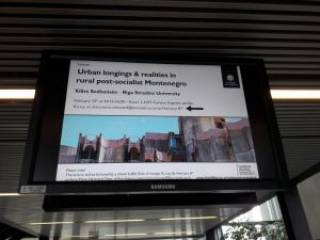
Location: Uppsala University, Sweden
- 7 December 2017 - DG NEAR consultative workshop, Brussels
SECOND CONSULTATIVE INFORM – DG NEAR MEETING
(BRUXELLES 08.12.2017, 10:00)
Agenda
Overview of the progress of the INFORM project and its policy implications (15-20 min.): Eric Gordy, UCL, UK.
- Presentation of main findings from: a) the first round of national workshops conducted with the national representatives for EU enlargement (15-20 min.); b) initial survey results regarding perceptions and experiences in relation to (in)formal institutions (15-20 min.): Rudi Klanjšek, University of Maribor, Slovenia.
- Presenting findings from the case studies - "A case study on enforcement of EU rules in the area of home slaughter" (15-20 min.): Reana Senjković, Institut za etnologiju i folkloristiku, Croatia.
- Informality in political life (15-20 min.): Misha Popovikj, Institute for Democracy, "Societas Civilis“, Macedonia.
- Attitudes towards the EU in six Western Balkan countries (15-20 min.): Ivan Damjanovski, Institute for Democracy, "Societas Civilis“, Macedonia.
- Discussion - exchanging views, gathering suggestions from DG NEAR representatives (30 min).
Organizers/presenters, INFORM
- Eric Gordy, INFORM lead, UCL, UK
- Rudi Klanjšek, INFORM WP5 lead, University of Maribor, Slovenia
- Reana Senjković, Institut za etnologiju i folkloristiku, Croatia
- Misha Popovikj, Institute for Democracy, "Societas Civilis“, Macedonia
- Ivan Damjanovski, Institute for Democracy, "Societas Civilis“, Macedonia
Participants, European Commission
- Maja Smrkolj, European Commission
- Willem Noë, European Commission
- Georg Ziegler, European Commission
- Davide Denti, European Commission
- David Hudson, European Commission
- Teresa Armengol
- 30 November 2017 - INFORM researcher participated in the 4th international Balkan express conference
INFORM researcher Prof. Hariz Halilovich participated in the 4th international Balkan studies conference "Balkan Express: The Invisible, the Overlooked, the Forgotten" on 1-2 December 2017 in Charles University, Prague, Chech Republic.
Prof. Halilovich presented a paper co-authored with Dr Nirha Efendic, titled “From refugees to trans-local entrepreneurs: Crossing the borders of informal and formal institutions in Bosnia-Herzegovina”. The paper is based on two case studies relating to the Bosnian emigrants, their approaches and experiences of formal and informal institutions. The presentation generated a vibrant discussion among the researchers specialising on the social, political and economic trends and issues in the region.
Conference programme: Balkan Express programme
- 18 November 2017 - Researcher Mirza Mujaric participated in the TRAIN 2017 project's seminar in Brussels.
INFORM researcher Mirza Mujaric participated in the TRAIN 2017 project's seminar on 19-23 November 2017 in Brussels.
The topic of TRAIN 2017 seminar was “Informality and corruption” and the aim of the event was to advocate the research based positive policy changes, and to present the research findings to country interlocutors working at respective EU institutions.
Mr. Mujaric presented findings from his research on tourism sector in Bosnia and Herzegovina.
The paper: Institutional perspective of Bosnia and Herzegovina’s tourism sector: The missing ingredient.
Location: Brussels, Belgium
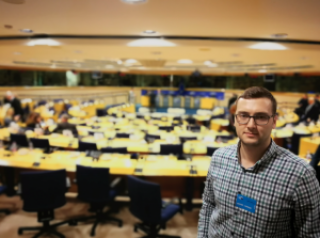
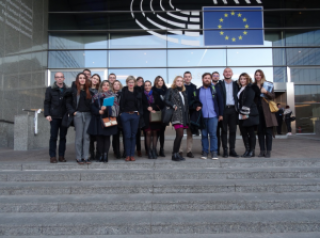
- 16 November 2017 - University of Maribor hosted the joint INFORM conference with policy makers in Bled, Slovenia.
On 16-17 November 2017, the University of Maribor hosted the joint INFORM conference in Bled, Slovenia. The conference brought together the INFORM researchers and representatives of the EU and Southeast Europe organizations involved in the enlargement process. The conference resulted in a joint conference declaration.
Full programme: Programme Conference declaration: Declaration Press release: Press release Organizing Committee: Miran Lavrič, Andrej Naterer, Eric Gordy, Predrag Cvetičanin, Rudi Klanjšek Contact: Miran Lavrič, +386 40 517 477, miran.lavric@um.si - 11 October 2017 - INFORM researcher participated in the MAER - Net conference
INFORM researcher Prof. Efendic participated in the MAER-Net conference on 12-14 October 2017 in Zeppelin University, Friedrieschafen, Germany. Prof. Efendic presented a paper that included the newest data on emigration intentions from the Western Balkans region gathered as part of the INFORM project.
More information about the event: MAER-Net Colloqium 2017
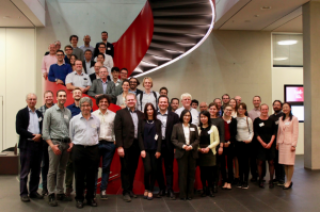
Location: Friedrichshafen, Germany
- 4 October 2017 - INFORM report on the informal life of political parties in the western Balkan societies is out
In the Western Balkans, those who seek benefits from political parties have almost six times the odds to being pressured to exchange their vote for money/favors than those who do not seek help. The fact is revealed within the INFORM project survey.
The report “Informal life of Political Parties in Western Balkan Societies” examines political parties’ strategies of electoral mobilisation that rely on clientelist practices, which, we find that vary across the countries in the region. Report findings are primarily based on data from multi-country survey conducted in May and June 2017 (N=6040 across the Western Balkans) as well as semi-structured interviews ethnographic field research and archival work.
Survey results suggest that one in five respondents in Montenegro (23%) and Albania (21%) reported receiving an offer of money or favours in exchange for a vote. The corresponding figures in Bosnia and Herzegovina (BiH) and Kosovo were 15% and 13% respectively, 8% in Serbia and 7% in Macedonia.
Graph 1: Have you ever been offered money or a favour in exchange for your vote in elections? (%)

Moreover, survey findings suggest that citizens also engage in establishing relationships with political parties and their officials for the sake of solving personal problems and ‘getting things done’ (benefit-seeking). When asked whether they have ever approached a party official for help, the highest proportions of affirmative responses were in Macedonia (14%) and Montenegro (13%), followed by respondents in BiH (10%), Kosovo (8%), and Serbia (7%) while lowest rate was recorded in Albania (5%) (Graph 2).
Graph 2: Reported turning to party officials for help (%)

Based on the survey data, we demonstrate that benefit seeking and offers from political parties are significantly intertwined. In Kosovo, benefit seekers have 11 times the odds of participating in a clientelist transaction, 9,4 times in Albania, 7 times in BiH and 6,3 times in Macedonia. While the lowest in the region, the odds of benefit seekers are still practically high in Serbia (3,8 times) and Montenegro (3,3 times). At the regional level, benefit-seekers have 5,6 times higher odds of participating in clientelist transactions than non-benefit-seekers.
These findings suggest that clientelism is widely present in the Western Balkan societies, and seems to have a notable effect on the electoral outcomes. Political parties offer money and favours in exchange for votes, but citizens also turn to political parties for help when necessary. Citizens also consider employment to be often associated with the use of informal connections, providing gifts, favours and even bribery, and are sceptical about the presence of merit-based employment. The perceptions that clientelist practices are widespread suggest that citizens view them as the normal way things are done in the Western Balkan societies.
The report is part of the EU Horizon 2020 project ‘Closing the gap between formal and informal institutions in the Balkans’ (INFORM). The project is set to study interactions between formal and informal institutions in the Western Balkan societies in the fields of politics, economics and everyday life, to track the influence of these institutions on the implementation of EU rules and regulations and to produce original research and policy recommendations. It is implemented by an international consortium led by the School of Slavonic and East European Studies (SSEES) at the University College London (UCL).
The full report can be found on the following link: REPORT ON THE INFORMAL LIFE OF POLITICAL PARTIES IN THE WESTERN BALKAN SOCIETIES
For more information, please contact:
Misha Popovikj (co-author of the report) misha@idscs.org.mk (+38971211439) or
Prof. Eric Gordy (coordinator of the INFORM Project) e.gordy@ucl.ac.uk (+442076798728)
- 28 September 2017 - The Institute of Ethnology and Folklore Research hosted an INFORM workshop in Vis, Croatia
The Institute of Ethnology and Folklore Research hosted an INFORM workshop in Vis, Croatia on 29-30 September 2017.
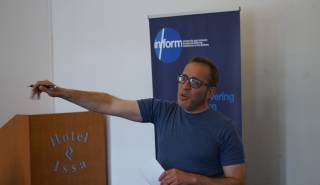
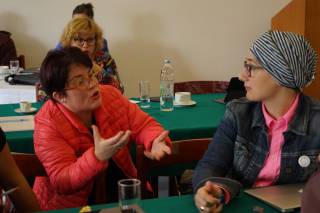
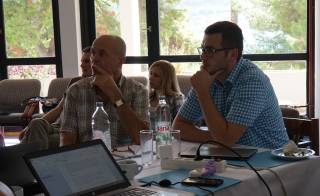
- 28 August 2017 - INFORM researchers participated in the 13th conference of the European Sociological Association
On 29 August – 1 September 2017, several INFORM researchers participated in the 13th conference of the European Sociological Association, held in Athens, Greece. The theme of this year’s conference was “(Un)Making Europe: Capitalism, Solidarities, Subjectivities”.
The researchers presented the theoretical insights as well as the empirical findings of the research conducted within the INFORM project framework. The presenters approached the phenomenon of informal practices from diverse aspects and addressing scholars from various subfields of sociology, thus introducing the INFORM project and the ideas it has generated to a large number of European sociologists.
The INFORM researchers gave presentations on the following topics:
- Adnan Efendic, Mirza Mujarić and Nenad Marković "Costs of informal networking in the South-East Europe: an empirical investigation";
- Danijela Gavrilović and Jelena Dinić "The Relationship Between Religiosity and Informal Economic Practices in Southeastern European Societies";
- Miloš Jovanović “Homosexuality in Serbia: Between Formal Acceptance and Informal Rejection”;
- Jelena Dinić “Value Orientations of Scholars from Serbia Living Abroad”;
- Marija Stefanović "Dialects Stigmatization in the Linguistic Market";
- Vjollca Krasniqi and Enriketa Pandelejmoni "Politics and Informality in South Eastern Europe";
- Misha Popovikj, Predrag Cvetičanin and Marija Stefanović "Clientelism in the Age of State Capture: A View on the Western Balkans";
- Predrag Cvetičanin and Nemanja Krstić “Culture of Austerity, Household Survival Strategies and Revival of Mechanical Solidarity”;
- Reana Senjković and Ines Prica "Bringing agriculture to its knees: food production between EU regulative and the peripheral capitalism's neo-feudal face".
- 26 August 2017 - INFORM researcher participated in the 1st International Scientific Conference on Economics in a Changing World
INFORM researcher Dr Adnan Efendić presented a paper “The costs of informal networking in SEE: an empirical investigation” in the International Scientific Conference on Economics in a Changing World, that was held from 27 till 28 August 2017 in Umag, Croatia.
- 5 July 2017 - INFORM National Workshop in Kosovo
On 6 July 2017, the Social Research Kosovo INFORM team hosted its first National Workshop in Pristina, Kosovo.
The goal of national workshops is to engage representatives of national offices for European integrations and other relevant stakeholders in order to raise awareness about the project, as well as to gather expert feedback on it.
Participants of the meeting in Pristina focused on issues related to transposition of EU rules in Kosovo and engaged in discussions on the methodology and approaches to the study of informality in the country. The representatives of the participating national offices expressed their interest in the INFORM project, provided valuable feedback, and emphasised their willingness to engage in future collaborations.
Participants:
- Mr Artan Çollaku, Director, Department of Coordination of the Stabilization and Association Process
- Ms Vjosa Beqaj, Director, Department of Sectoral Policies, Ministry of European Integration
- Ms Hazbije Krasniqi, Head of the Central Office for International Cooperation, Ministry of Environment and Spatial Planning
- Mr Kenan Tora, Senior Advisor, Ministry of Foreign Affairs
- Mr Stergios Tragoudas, Task Manager-Education, European Union Office to Kosovo
- Ms Mimoza Zeqiri, European Union Office to Kosovo
- Mr Dukagjin Pupovci, Executive Director, Kosovo Education Center
- Mr Dren Berishaj, Social Research Kosovo
- Dr Vjollca Krasniqi, INFORM Kosovo Lead Researcher, Social Research Kosovo
During the workshop, the Ministry and national office representatives engaged in discussions about the project outline and methodology, as well as the political and cultural context of Kosovo.
The participants placed great importance on and expressed interest in understanding the interplay between informal practices and formal rules, that is, their implementation and the impact they have on the sphere of economy, politics, and everyday life. They also acknowledged Kosovo’s political challenges in the EU integration processes.
The workshop participants highlighted the importance of research-based policy-making; they posited the INFORM project as an important resource offering data that would to produce better understanding of the economic, political and social dynamics of Kosovo in the context of the country’s EU integration efforts. Moreover, the participants expressed the necessity to gain deeper knowledge on the impact of new laws on the everyday life of citizens.
The meeting participants identified several areas for potential cooperation in future.
They include, but are not limited to:
- Sharing research findings and disaggregated data with state institutions, civil society, academia, media and the broader public in Kosovo;
- Enhancing cooperation between state institutions, academia, and civil society;
- Fostering dialogue on how to close the gap between formal and informal institutions;
- Developing research data-based policy recommendations on how to overcome informality.
- 14 June 2017 - Review Meeting in Brussels
On 15 June 2017, INFORM team members participated in the first review meeting of the project, hosted at the European Commission’s Research Executive Agency in Brussels. The meeting was held to review the first 12 months of the project and discuss feedback on the research activities carried out during this period.
During the day-long event the project team leaders gave presentations on the work and accomplishments of their teams, and the evaluators provided valuable and insightful comments on the progress of the project and potential ways to improve it.
The reviewers emphasised the innovative aspects of the project’s methodological approach, as well as the horizontally organised project management structure that allows for wide participation of both the involved partner institutions and individual team members. As preliminary results of the quantitative survey were presented during the review meeting, the evaluators were impressed by the availability of the data earlier than originally scheduled. They also expressed the hope that the INFORM project, through its research results, will contribute significantly to the understanding of the Europeanisation discourses and practices, including by providing critiques to the mostly abstract discourse of the process.
In order to improve the applicability of the produced research results, the reviewers suggested that the INFORM project might benefit from more balanced attention to formal institutions, on top of the project’s current focus on informal institutions and practices. The evaluators also remarked that one of the most difficult tasks of the project may turn out to be getting the policy recommendations devised during the project to people and government institutions willing to implement them.
The INFORM team members thanked the reviewers for the thoughtful comments and enthusiastic feedback, and the meeting was concluded on a highly positive note and with encouragement to continue the work.
Participants
- Evaluators and EC representatives:
- Andreas Obermaier, Project Adviser, EC Research Executive Agency
- Zoltán Krasznai, Policy and Project Officer, DG Research & Innovation
- Adinda Focke, Administrative and Financial Officer of INFORM, REA
- Prof. Dieter Segert, Academic Reviewer, University of Vienna
- Prof. Anna Krasteva, Academic reviewer, New Bulgarian University
INFORM team representatives:
- Eric Gordy, Project Coordinator, UCL
- Vesna Milanović, Project Manager, UCL
- Predrag Cvetićanin, WP2 leader, Centre for Empirical Cultural Studies of South-East Europe (Serbia)
- Ilina Mangova, WP3 leader, Institute for Democracy “Societas Civilis” Skopje (FYR of Macedonia)
- Adnan Efendić, WP4 leader, Center for Intradisciplinary Social Applied Research Bosnia and Herzegovina)
- Rudi Klanjšek, WP5 leader, University of Maribor (Slovenia)
- Klāvs Sedlenieks, WP6 leader, Riga Stradins University (Latvia)
- Gentiana Kera, team member, Center for Historical and Anthropological Research (Albania)
- Vjollca Krasniqi, team member, Social Research Kosova (Kosovo)
- Miran Lavrič, team member, University of Maribor
- Inses Prica, team member, Institute of Ethnology and Folklore Research (Croatia)
- Reana Senjković, team member, Institute of Ethnology and Folklore Research (Croatia)
- 7 June 2017 - INFORM National Workshop in Macedonia
On 7 June 2017, the Institute for Democracy Societas Civilis-Skopje (IDSCS) organized the first National Workshop in Skopje, Macedonia with representatives from the Secretariat for European Affairs, the Ministry of Justice and the Ministry for Agriculture, Forestry and Water Supply.
The goal of national workshops is to engage representatives of national offices for European integrations and other important stakeholders in order to raise awareness about the INFORM project, as well as to gather expert feedback on it.
The National Workshop in Skopje was organized to inform public administration officials about the research and findings of the INFORM project and to gather expert feedback on the topic of informal institutions in the European integration process.
The workshop participants emphasized the importance of the INFORM project in defining and understanding the relationship between informality and formality, as well as highlighting the influence of informal institutions on policy implementation and harmonization with the acquis.
The participants also pointed out that the motivation of the people directly working on the EU integration process is key for the process to be successful. Consequently, they noted, the motivation for transposition has significantly weakened due to the fact that Macedonia remains far from EU membership.
It was also pointed out that the state administration needs assistance through concrete policy papers and recommendations, especially on how to address informal obstacles. The participants stressed the need for a retention policy for the public administration in order to sustain the European integration process.

Location: Skopje, Macedonia
- 7 June 2017 - INFORM National Workshop in Albania
On 7 June 2017, the Center for Historical and Anthropological Research (QKHA) INFORM team hosted its first National Workshop in Tirana, Albania, with representatives from the Ministry of Integration and the Ministry of Foreign Affairs joining the meeting.
The goal of national workshops is to engage representatives of national offices for European integrations and other important stakeholders in order to raise awareness about the INFORM project, as well as to gather expert feedback on it.
Participants:
- Ms. Stela Ademi - Ministry of European Integration
- Ms. Lorela Simoni - Ministry of European Integration
- Mr. Ervis Sulejmani - Ministry of European Integration
- Ms. Brunilda Tushaj - Ministry of European Integration
- Mr. Eduart Qatja - Ministry of Integration
- Mr. Sokol Dedja - Ministry of Foreign Affairs
- Ms. Armanda Hysa - Centre for Historical and Anthropological Studies
- Ms. Enriketa Pandelejmoni - Centre for Historical and Anthropological Studies
- Ms. Gentiana Kera - Centre for Historical and Anthropological Studies
- Ms. Brikena Balli - Centre for Historical and Anthropological Studies
Workshop participants stressed the importance of the INFORM project in understanding the impact of new laws on the everyday life of citizens. The Ministry representatives highlighted that the project has the potential to:
- produce important data/ input for state institutions;
- increase the cooperation between state institutions, universities and civil society;
- provide concrete recommendations based on research results that may actually help in closing the gap between formal and informal institutions.
Participants from the Ministries also expressed their interest in concrete analysis of cases of informal practices that have transformed into formal practices, as well as in-depth examples of the ways in which formal rules leave space for informality.
- 7 June 2017 - INFORM national workshop in Serbia
On 7 June 2017, the first National Workshop in Serbia was held in Belgrade in the premises of the European Integration Office (SEIO) of the Government of the Republic of Serbia. The meeting brought together representatives of the European Integration Office and the INFORM team from the Centre for Empirical Cultural Studies of South-East Europe (CECS/CESK).
The goal of national workshops is to engage representatives of national offices for European integrations and other important stakeholders in order to raise awareness about the INFORM project, as well as to gather expert feedback on it.
The European Integration Office of the Government of the Republic of Serbia was established on 14 March 2004 as a Serbian Government service. SEIO prepares for adoption the acts of the Government designed for supervising, directing and harmonizing the activities of ministries and special organizations in relation to the European Union association and accession and formulates public information on the process of European Union accession and association.
During the first part of the meeting, the CECS team introduced the INFORM project to the SEIO representatives, providing an overview of the project and highlighting its research agenda. The second half was dedicated to discussions and exchange of views about the project, focused on gathering suggestions from the SEIO representatives.
Presenters (CECS):
- 1. Predrag Cveticanin, lead of the CESK team
- 2. Danijela Gavrilovic, senior researcher
Participants (SEIO):
1. Srđan Majstorović, Deputy Director
2. Ana Drljević, Department for Planning, Programming, Monitoring and Reporting on EU Funds and Development Aid
3. Nataša Savić Janjić, Department for Communication and Training
4. Vladimir Lazović, Department for Planning, Programming, Monitoring and Reporting on EU Funds and Development Aid
Main points/issues raised:
The SEIO representatives agreed on the importance and usefulness of the project, particularly in raising awareness about the problems caused by changes in contemporary Serbian society and internal obstacles to the implementation of the norms and standards of the EU. They expressed their belief that INFORM and SEIO can help each other in formulating recommendations and measures for successful implementation of the integration process. INFORM research findings would assist SEIO officials in their decision-making processes, and SEIO would provide information about their practical experience regarding the integration process.
The SEIO representatives also stressed that the researchers involved in the INFORM project could offer suggestions as to the best means for promoting the standards and norms of the EU due to their deep understanding of the practices and opinions related to the integration process in a deeper and more essential way.
The general recommendation given to the INFORM representatives was to organise extensive presentations of the team’s research findings and introduce the findings to government representatives, with the goal of raising awareness about the actual social climate in Serbia and the activities required to overcome “bad informality”. The SEIO representatives were of the opinion that raising awareness about values is still an important process and task that needs to be realized.
The SEIO representatives also expressed their willingness to engage in joint collaborations on the recommendations for a more successful implementation of the EU integration process in Serbia.
- 31 May 2017 - INFORM national workshop in Montenegro
On 1 June 2017, the Riga Stradins University INFORM project team hosted its first National Workshop in Podgorica, Montenegro.
The goal of national workshops is to engage representatives of national offices for European integrations and other important stakeholders in order to raise awareness about the project, as well as to gather expert feedback on it.
Representatives of Montenegro’s Ministry of European Affairs (MEP) participated in the Podgorica workshop, along with INFORM researchers from Riga Stradins University (Latvia). The MEP representatives expressed their interest in the INFORM project, provided feedback, and stressed their openness to future conversations and meetings.
Participants:
1. Ms Violeta Berisaj, Head of Department for the Political Criteraia and the Rule of Law - Directorate for European Affairs
2. Ms Mira Radulović, Head of Department for the Political System - Directorate for Legal Harmonisation with the Acquis
3. Ms Tatjana Tomić, Secretary of the working group for chapters 1 and 6 - Directorate for European Affairs
4. Dr Klavs Sedlenieks, Lead Investigator, INFORM, Riga Stradins University
5. Dr Ieva Puzo, Researcher, INFORM, Riga Stradins University
6. Ms Diana Dubrovska, Researcher, INFORM, Riga Stradins University
During the workshop, the Ministry representatives provided extensive feedback on the INFORM project and engaged in discussions both about the project as a whole and the ethnographic work conducted so far (by Dr Klavs Sedlenieks) and yet to be carried out (by Dr Ieva Puzo and Ms Diana Dubrovska) in Montenegro specifically.
The Ministry representatives stressed their interest in understanding the discrepancies between formal rules and their implementation, for instance, in the areas of transportation safety and agricultural practices. They also acknowledged the existence of a clash between the EU institutional way of accomplishing tasks and local traditions, expressing their wish to find out more about this issue from the INFORM project results.
The workshop participants from the Ministry of European Affairs stressed that the people of Montenegro need to invest a lot of resources in order to comply with various EU rules and regulations, for instance, in ensuring compliance with food safety regulations. The question of access to various resources – for example, computers that would allow farmers to even read local and EU regulations – was raised. Overall, the future of the country’s agriculture sector was the main concern for the Ministry representatives. Gender issues – for instance, preference for boys in Montenegro – were also raised as a topical question.
Regarding potential policy recommendations to be gained from the INFORM project, the Ministry representatives highlighted two issues:
- Suggestions for overcoming the difficulty of aligning (informal) practices with (formal) regulations;
- Suggestions for ensuring that Montenegro’s accession to the EU does not come at a too high price for the country’s citizens.
- 22 May 2017 - INFORM national workshop in Bosnia and Herzegovina
On 23 May 2017, the Center for Intradisciplinary Social Applied Research (Sarajevo, BiH) hosted its first National Workshop in the INFORM project framework.
The goal of national workshops is to engage representatives of national offices for European integrations and other important stakeholders in order to raise awareness about the project, as well as gather expert feedback on it.
Representatives of the Directorate for European Integration of Bosnia and Herzegovina, as well as several individual experts on European integrations took active part in the Sarajevo workshop. They expressed their interest in the INFORM project, provided feedback, as well as offered their expertise for future collaborations.
Participants:
- Mr Edin Dilberovic, Head of the Directorate for European Integration
- Ms Mirela Cosic, PR at the Directorate for European Integration
- Ms Maja Rimac-Bjelobrk, VP at the Directorate for European Integration
- Ms Marina Kavaz-Sirucic, VP at the Directorate for European Integration
- Ms Amira Lazovic, VP at the Directorate for European Integration
- Mr Adnan Tatar, Coordinator for European integration at the Government of FBiH
- Ms Azra Hadziahmetovic, Professor at the University of Sarajevo, Head of Master’s programme for European integration
The CISAR was represented by Dr Adnan Efendic, Dr Hariz Halilovich, Dr Ismet Kumalic, and Mr Mirza Mujaric.
The workshop proved to be productive and engaging, with stakeholder participants providing extensive feedback and engaging in fruitful discussions with the INFORM project team.
Most importantly, the participants acknowledged the fact that informal institutions constitute a roadmap for setting up the formal ones as well as that the formalisation of informal institutions allows to avoid creating gaps. The stakeholders expressed their concern that EU rules do not always recognise the importance of informal institutions in the country. Because of this, the implementation of adopted rules is often lacking, thereby creating the ground for emergence of informal practices and institutions.
The workshop participants also identified the inadequate efforts of local institutions in the implementation of EU rules and, therefore, in the creation of the gap between formal and informal institutions in Bosnia and Herzegovina and the country’s population losing trust in its formal institutions. It was suggested that the INFORM project would gain from deeper examination of this factor and suggestions as to how to regain people’s trust in formal institutions and capacity building.
The participants also stressed that Bosnia and Herzegovina’s difficulties in adopting certain EU rules and directives are caused by the country’s complex internal structure – that is, the fact that it consists of three parts (FBiH, RS, BD) that are often at different stages of the accession process.
- 3 May 2017 - INFORM researcher presents at a New York convention
Borjan Gjuzelov, INFORM researcher, presented the initial findings of the study “Political clientelism in the Western Balkans: Perpetuum mobile for re-election?” at the 22nd Annual World Convention of the Association for the Study of Nationalities. The event took place in New York, USA on 4-6 May 2017.
The research presented at the Convention reviews clientelistic practices in the Western Balkan states (Albania, Bosnia and Herzegovina, Montenegro, Kosovo, Macedonia, Serbia and Croatia), emphasizing the gap between the weak implementation of the formal legislation and the informal practices and expectations of the citizens. The research differentiates between electoral ad hoc clientelism based on one-time provision of goods in exchange for electoral support (i.e., vote-buying) and continuous relational clientelism based on long-term loyalty built on various forms of abuse of public goods for party interests (e.g., partisan employment, abuse of public procurement, etc.).
Gjuzelov is currently a PhD candidate in political science at Queen Mary University in London, United Kingdom, and collaborates with the Institute for Democracy Societas Civilis-Skopje as a researcher on the international and interdisciplinary Horizon 2020 project INFORM: Closing the gap between formal and informal institutions in the Balkans. His doctoral work explores the evolution of informal institutions and “telephone justice” in Macedonia in the last three decades of the late Yugoslav socialism and the early transition to the present day EU integration.
- 5 April 2017 - INFORM Maribor methodology workshop
University of Maribor hosted the INFORM methodology workshop in Maribor, Slovenia on 6-9 April 2017 in order to discuss the project status, methodology and national workshops.


- 8 December 2016 - DG NEAR consultative workshop, Brussels
Representatives of INFORM (Eric Gordy, Rudi Klanjšek, Vjollca Krasniqi and Klavs Sedlenieks) had a meeting with DGNEAR representatives (Georg Ziegler, Woflgang Nozar, Ritva Heikkinen and David Hudson) to consult about the INFORM activities in the context of EU enlargement.
During the meeting the representatives of INFORM introduced with the research agenda, methodology, theoretical approach, policy engagement, capacity building and dissemination activities.
In the discussion part the participants identified the main challenges in the context of EU enlargement processes in the Balkans such as unresponsive public administration, hurdled by lack of service mentality, lack of evaluation mechanisms and efforts, and mainly, by lack of coordination between different branches. There is also a risk of returning back to the pre-accession practices when certain chapters are closed. This could be partly explained by the fact that certain reform efforts were not communicated well enough.
Participants of the meeting indicated that DGNEAR is interested in identifying (informal) networks and who is included in them; how to better address the issue of bringing informal in the formal rules; which informal institutions are there, what is the perception of those rules vis-à-vis formal rules; problem of clientelism, state capture, vote buying; how to better communicate the reform efforts (and its potential results).
Agenda_DG NEAR meeting_9Dec201


Location: Brussels, Belgium
- 8 December 2016 - Jean Monnet International Conference: rule of law and corruption in the western Balkans: comparative approaches, Zagreb
On 9 December, 2016 representative of INFORM Jovan Bliznakovski (Institute for Democracy "Societas Civilis" Skopje") attended the second Jean Monnet International Conference Zagreb 2016 organized at the Faculty of Political Science University of Zagreb. Jovan Bliznakovski presented INFORM’s research strategy and the case study on political clientelism.
Agenda_Conference_Zagreb_9Dec2016
Location: Zagreb, Croatia
- 6 December 2016 - Policy Summit: Balkans - Boosting Connections on the road to the EU, Brussels
On December 7, 2016 representatives of INFORM Rudi Klanjšek (University of Maribor) and Klāvs Sedlenieks (Riga Stradiņš University) attended the Balkan Summit "BALKANS – Boosting connections on the road to the EU” organised by Friends of Europe.
Representatives of the Balkan countries that aim to joining EU discussed the progress achieved so far and the challenges that lay ahead. The event was attended by a large number of people who are interested in the discussed issues as well as the Commissioner Johannes Hahn. Ridi Klanjšek as well as Klāvs Sedlenieks took active participation in the discussion session, pointing out the incongruences of the “official discourse” and the actual processes, i.e., about the gap between the formal and informal at all levels. During the discussions in the intervals information about the INFORM was distributed to the participants both in form of the project “postcards” as well as orally.
- 4 December 2016 - Conference: Europe as a Global Factor, Brussels
DG RTD, Unit Open and Inclusive Societies hosted a conference “Europe as a Global Actor” in Brussels on 5 December 2016.
The aim of the conference was to discuss with projects selected for funding under the Horizon 2020, INT 2015 calls "Europe as a Global Factor" the policy aspects of their research objectives and to provide them with networking opportunity enabling further cooperation and synergies.
- 27 October 2016 - INFORM Tirana Workshop
Centre for Historical and Anthropological Research (QKHA) hosted the INFORM workshop in Tirana, Albania on 28-30 October 2016. The participants worked on the INFORM pilot survey questionnaire carried out in Albania, Macedonia, Serbia, Kosovo, Bosnia and Herzegovina.
Along with discussions on the survey results, the event also aims at intensive training of young researchers in the areas of research design, field research techniques, qualitative and quantitative data gathering, analysing and processing.
Agenda Tirana Seminar 28-30 October

Location: Tirana, Albania
- 28 September 2016 - INFORM London Inaugural Workshop
Venue: UCL School of Slavonic and East European Studies
16 Taviton Street London WC1H 0BW (Bloomsbury Campus - see UCL Maps) fourth floor, Classrooms 431 & 433Southeast Europe has seen a century of continuous transformation and “transition” – the disappearance and emergence of states, political and legal systems, ideologies, institutions, and social classes. This has been accompanied by a stability of social practices resistant to change. Shaken by radically changing ideological and legal structures, citizens rely on customary and informal social networks of kin, symbolic kin, and friends for meeting economic needs, and on clan- or kin-related structures rather than the rule of law for security and protection. We trace the persistence of informal practices to: 1) the external origin of major transformations, including the “transitions” to and from socialism; 2) the incomplete character of change, which has tended to be replaced by equally radical but diametrically opposed projects; 3) the development of a buffer culture based on informal practices, directed to enabling people to survive under unstable conditions; and 4) the widening gap between formal institutions and informal social practices.
The distance between proclaimed goals and existing practices represents the key challenge to the European integration of Balkan societies. The integration process could end with superficial change, behind which the ""real"" social life of corruption, clientelism, tension, inequality, and exclusion will continue to unfold. We propose to explicate the key formal and informal “rules of the game”, and to identify and decipher the ""unwritten rules"" which underpin tactical maneuvering between formal and informal institutions, in various spheres and at various levels of social life. These would then be compared to the demands and recommendations laid out in the key EU documents outlining expectations from Southeast European states. The goal is to contribute to the formulation of policy recommendations which would aim not to eradicate informal practices, but to close the gap between formal and informal institutions in Balkan societies.
Participant institutions: University College London (UK), Institut za Etnologiju I Folkloristiku (Croatia), University of Maribor (Slovenia), Center for Intradisciplinary Applied Social Research (Bosnia and Herzegovina), Center for Emprical Cultural Studies of Southeast Europe (Serbia), Institute for Democracy “Societas Civilis” Skopje (Macedonia), Qendra e Kerkimive Historike dhe Antropologjike (Albania), Social Research Kosovo (Kosovo), Rigas Stradina Universitate (Latvia)
Case Studies:
- „There is no free (informal) lunch! Cost of informal networking of entrepreneurs in WB“, Efendic dr Adnan and Hysa dr Armanda
- THE MIGRATIONS (interactions between diaspora in EU and other countries and political and economic practices in localities of origin; informal sources of political influence; effects of informal channels of economic influence on local interethnic relations), Hariz Halilovich & Gerda Dalipaj
- Partial enforcement of EU rules: The case of home slaughter of pigs and sheep, Miran Lavrić and Reana Senjković
- Political clientelism, Vjollca Krasniqi and Misha Popovikj
Theoretical Framework and Survey Questionnaire, predrag cvetičanin:
- 28 August 2016 - INFORM Ohrid workshop
Institute for Democracy “Societas Civilis” (IDSCS) hosted INFORM workshop in Ohrid, Macedonia from 29 September to 1 October 2016 for the purpose of developing a survey questionnaire for the INFORM project.
The workshop in Ohrid was oriented towards creating methodology for the research part of the project with a particular focus on preparing a questionnaire for a regional field survey which, in the phase of empirical data gathering, will be carried out in Macedonia, Serbia, Kosovo, Bosnia and Herzegovina, Montenegro and Albania. The aim of the questionnaire is to contribute to data gathering on the informal institutions in the Balkans in three research areas: politics, economy and everyday life.
Location: Ohrid, Macedonia
- 29 July 2016 - INFORM Prizren Workshop
Social Research Kosova l.l.c. hosted the INFORM workshop in Prizren, Kosovo on 29-31 July 2016. At the workshop participants had the opportunity to become acquainted with all the stages of Project Cycle Management ranging from how to write a project proposal, to problem and stakeholder analysis, intervention logic, monitoring and evaluation, including budget planning and narrative and financial reporting.
Agenda_Prizren_29-31July 2016

Location: Prizren, Kosovo
- 27 June 2019 - INFORM Novi Sad Workshop
Centre for Empirical Cultural Studies of South-East Europe hosted the INFORM workshop in Novi Sad, Serbia on 27-28 June 2016.
The workshop dedicated to theory building on the topic of informal institutions in Southeast Europe. The participants were given the possibility to follow the steps of theory building: the discussion of key concepts such as institutions, constraints, enforcement belts, and how the formal and informal permeates through them.

Location: Novi Sad, Serbia
- 20 May 2016 - INFORM Sarajevo Workshop
Center for Intradisciplinary Social Applied Research (CISAR) hosted the INFORM workshop in Sarajevo, Bosnia and Herzegovina on 21-22 May 2016. The aim of the workshop was to further develop a theoretical background for the INFORM project, as well as to share the knowledge among partners about Project management, administration of the project and finances. The workshop participants from the region and UK further agreed steps to be undertaken, with special focus on potential case studies that should be developed and selected during the next INFORM meeting.
Agenda INFORM Sarajevo 21 - 22 May 2016- 18 May 2016 - INFORM Skopje Inception Workshop
The INFORM project held an inception workshop in Skopje, Macedonia on 19-20 May 2016 to discuss the project objectives, tasks, and work plan and review theoretical framework, methodological issues and research methods. The project members also planned further capacity building activities and became acquainted with project management regulations.
The workshop gathered the participants from 5 project members, including Institute for Democracy “Societas Civilis” – Skopje (Macedonia), University College London (United Kingdom), Centre for Empirical Cultural Studies of Southeast Europe (Serbia), Social Research Kosova (Kosovo) and Center for Historical and Anthropological Research (Albania).
Skopje Workshop Agenda 19 and 20 May 2016Location: Skopje, Macedonia
 Close
Close


